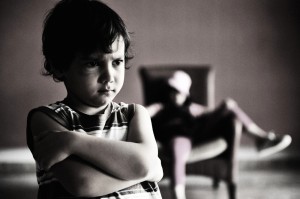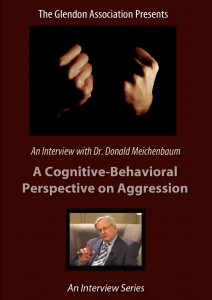A Gender Sensitive Approach to Violence

Dr. Don Meichenbaum, PTSD expert, discusses an individuals journey from birth, to engaging in violence in this exclusive interview series with Dr. Lisa Firestone.
I’m a clinical psychologist and for thirty-five years, I had been involved at the University of Waterloo, which is near Toronto and we have developed what are called cognitive-behavioral procedures to work with children, adolescents, and adults. In fact, we developed a procedure called stress-inoculation training, which is the best evidence- based intervention in working with angry and aggressive individuals.
So after being at the University for 35 years, I retired and I have become a research director for the Melissa Institute For Violence Prevention and I invite your viewers to visit the website because we have a lot of information that they could access, both as educators and others, about how to alter the trajectory of violent behavior.
Many of the individuals I work with, I have a whole project now with returning veterans from Iraq and Afghanistan and they have a high incidence of not only dealing with the PTSD, but the anger and substance abuse. So we have worked with them and having them appreciate how you can also address substance abuse which also exacerbates it.
I think we have a pretty good feel, and if your viewers visit the Melissa Institute website, you will see how you make a violent individual. You see, Melissa was a young lady who went to Washington University in St. Louis, and she was in her last year and she was car jacked and murdered. Now when such a tragedy like that befalls an individual, one of the things they do is they transform their pain into something good that could come of it. So they created this institute against violence and I am the research director. We run conferences, we train people, and we do consultations. Everything that the Melissa Institute does is available free and online. So if your viewers are interested in following this up, I really invite them to visit the www.MelissaInstitute.org. There’s a sister website for educators, these websites have gotten over 3 million hits, so people are using these procedures with some efficacy pretty much around the world.
Violence Prevention: A Gender Sensitive Approach
This is a critically important event. You watch the 6 o’clock news, CNN, Headline news, every one is another story of violence. We now need to address that — both on a preventative and treatment basis — and that’s what I and the Melissa Institute are committed to doing. And you need to do this in a gender-sensitive way because it turns out that treating girls is different than treating boys in terms of how aggression develops and therefore, you need gender-specific kinds of issues.
Dr. F: What do you see as the differences?
Once again, we had a whole conference at the Melissa Institute (about this) and so I’m going to only capture the bit of this, but girls are much more likely to have what is called relational aggression, silent bullying, gossiping, exclusion and so forth. Boys do this as well and there are different developmental courses. Girls are more likely to have a history of victimization, they’re more likely to have co-morbid features of depression, suicidality, so one of the things that is now been developed, both by Beth Peppler, in Toronto, programs in Oregon, is how to have gender-sensitive interventions that address these kinds of needs.
The other thing is that these girls who are violent and aggressive are more likely to have a history of victimization that needs to be addressed, as part of the therapy process. So over and above the skills training, the stress inoculation, you need to have trauma-focused interventions, which is the major treatment for PTSD in the area of cognitive-behavioral interventions. Remember I said that individuals who have PTSD are very prone, up to 7 times more likely to be violent. So addressing the co-occurrence of that is an absolutely critical issue.
Dr. F: And that’s true in males as well, I imagine.
That’s true of males and females.
Dr. F: Because men that we interviewed who have been violent, have incredible trauma histories.
DM: Yes, incredible and the question is how can we help them deal with that trauma history besides using aggressive responses? How do you get them to transform that anger, that pain, that grief, that guilt, that shame.
No One is Doomed to a Life of Violence
I think that there are individuals who fall along the dimension of angry and aggressive behavior, especially with co-occurant problems, who vary in their prognosis and the likelihood of them benefiting from treatment. But from my perspective, I don’t think the data says there’s anyone you should write off, OK. I do not think you are doomed. Now, the later you intervene, the less likelihood of success. The more likely that people are surrounded by peers where aggression is valued and honored in that culture, the degree to which aggression works, the lower the likelihood of them benefitting from treatment.
But there are numerable accounts of people who have been very angry and aggressive, who have found faith, spirituality, who have found a mate, who have found a mission, who have transformed their pain into something good that could come of it. So from my point of view, I think that there is hope for all. That doesn’t reduce the risk, I’m not an unrealistic person, but I would not give up on any individual and moreover have them think about how they can make a gift of their experience. So we have asked people who have been rather angry and aggressive, what advice would they have for other people so they don’t follow in their footsteps? So the name of the game is how to make a gift of your experience that could help others. There are clearly some serial killers, other people who I would not like to release and count on therapy to avoid that process. Them being put away is reassuring to me and to society. But before you ever got to that point, do you think we could have intervened?
Especially with those people with histories, you’re talking about 20% of kids coming into schools having that background. What are we now doing to address that?
Order the Full DVD Interview:
 A Cognitive-Behavioral Approach on Aggression
A Cognitive-Behavioral Approach on Aggression
In this DVD, Dr. Donald Meichenbaum discusses violence and aggression, from origin to treatment. Dr. Meichenbaum draws upon his wealth of experience to articulate both how violent individuals are created and the thoughts that drive violent behavior. Dr. Meichenbaum advocates effective interventions with violence and explains the importance of Stress-Inoculation Training, which he describes as the “best evidence based intervention in working with angry and aggressive individuals.” He also defines key gender differences in aggression. “So our mission,” says Dr. Meichenbaum, “is not only to develop effective treatment programs for people who are angry and aggressive, the question is are we committed as a society to do that which we know to prevent violence in the first place? I think this film will go a long way in educating people to make that kind of passionate commitment.”
Tags: abuse, children, PTSD, teaching kids, trauma, violence









Leave a Reply